The year is 793 AD. The people of Northumbria quake with dread. For months, fierce, foreboding omens have been sweeping through the heavens and across the land — whirlwinds tearing through villages, lightning strikes on cloudless days, and, most terrifying of all, fiery dragons glimpsed flying across the night sky.
Surely these are warnings sent by God — but warnings of what?
It finally becomes clear on the morning of June 8th.
That morning, the monks of Lindisfarne peer anxiously through the fog, their breath catching in their throats as dark shapes come into view on the horizon: first one, then three, then a dozen — longships slicing through the grey waters, oars moving in perfect unison. One monk drops his prayer book and runs to sound the warning bell, but it is already too late.
The wretched heathens, as the chroniclers would later call them, leap from their vessels with axes gleaming. By sunset, God's church at Lindisfarne lies in smoking ruins, centuries of illuminated manuscripts reduced to ash, chalices and reliquaries vanishing into Norse sea chests.
This was the very heart of Christian civilization in England — if it could fall, what could remain standing?
So began the Viking Age. By the time it ended some three hundred years later, the consequences of these raids and invasions would reshape the English language forever, perhaps less obviously than the Norman Conquest later would — but much more deeply.
From Danish terror to Danish law
The story began much as I described it above, that is, with terror and blood. From the late eighth century onwards, Norse raiders from Denmark and Norway descended upon English shores with devastating effect. But what started as seasonal raids soon transformed into something more permanent. By the late ninth century, Vikings weren't just visiting — they were settling, farming, trading, and marrying into the local population.
By the way, a terminological note: the word Viking refers specifically to those medieval Scandinavians who went seafaring and raiding. It’s not an ethnic term per se — but in our case, since the Scandinavians who settled in England came first as Viking raiders, I use Viking roughly synonymously with Norse in this article.
At any rate, one hundred years after the raid at Lindisfarne, King Alfred the Great made peace with these Norsemen, and formally recognized their control over the north and east of England.
This region was called the Danelaw — a vast territory covering roughly the north and east of England, where Danish law and custom prevailed. The peace wouldn’t last forever, but it created a linguistic melting pot which did endure, one where Old English and Old Norse speakers lived side by side for generations.
And, although the Vikings carried off many English treasures in their day, they also left something behind: words. This Norse influence transformed the English language to such an extent that, today, around 5% of English words have Scandinavian origins.
These new Norse words pushed out native Old English terms — for example, Norse leg replaced Old English shank, skin pushed aside hide, and they supplanted hie. The words shank and hide survived and are still used in some limited contexts today, but they’re no longer the “normal” words for the concepts in question.
What made this contact unique was how closely related the two languages were. Both belonged to the Germanic family, and their speakers could likely understand each other with some effort. This combination of physical and linguistic proximity made the eventual language mixing almost inevitable.
The words we got from Vikings
The Norse influence on English was unlike the later impact of Norman French. While French terms came in through court, law, and high culture, Norse words infiltrated through everyday conversations in fields, homes, and marketplaces.
Consider these common English words: sky, skin, leg, window, cake, dirt, law, husband, fellow. All are Norse in origin, replacing or supplementing native Old English terms. Often the Old English word was replaced altogether, as when Norse-derived law completely replaced the Old English term æ.
As we saw before with shank and hide, the Old English term sometimes survives, albeit only in special contexts. For example, Norse sky replaced Old English heofon — although Old English heofon also survives as heaven. The verb niman, which got replaced by take, doesn’t survive as a verb anymore, but its past participle numen survives as the adjective numb ‘taken (by cold).’ (The b in numb was added later, and was never actually pronounced.)
Although the borrowing of so many everyday words from Norse is remarkable, what is more remarkable still is that English adopted Norse function words — those small grammatical pieces that form the skeleton of a language: they/them/their, till, both, though.
Languages rarely borrow such fundamental elements unless the contact is intense and sustained. Imagine what it would take for modern English to adopt question particles from Japanese — it’d be almost unthinkable under normal circumstances.
Strangely, many Norse loanwords don't appear in written English until centuries after the Vikings settled. This suggests that words of Norse origin circulated in everyday speech long before they were deemed acceptable enough to write down.
How the Norse changed English grammar
It’s even possible that Old Norse influence had an effect beyond English words, reaching into the heart of English grammar.
Old English, like modern German, had a complex system of grammatical cases and gender, expressed mainly by adding endings to words. But over time, many of these features disappeared, resulting in the more streamlined grammar we use today.
While this transformation likely had multiple causes — including natural language evolution and sound changes eroding word endings — many scholars think the need to communicate across the Norse-English language barrier played a role in the loss of these endings, and the birth of the modern English grammar system.
Beyond endings, other aspects of English grammar show possible Norse influence. For example, the tendency in English to form phrasal verbs or verb-particle constructions (take off, break down, give up) may also come from Old Norse, at least in part.
Old English had many prefixes which could provide shades of meaning — for example, there was the prefix to-, which meant ‘apart’, as in berstan ‘break’ vs toberstan ‘break apart’. But Old Norse had no such prefixes, and they mostly vanished from English too in the centuries after the Norse settlement. As a result, verb-particle constructions like break apart, where the nuance is conveyed by a separate word, became common. These constructions were also common in Old Norse. Coincidence?
What makes the Norse influence unique is just how deeply it permeated the English language. French gave us thousands of words, but these were typically for specialized domains — government, law, cuisine. Norse words, by contrast, are among our most basic terms for everyday objects and actions. And, while French influence on English grammar is minimal, Norse influence reshaped part of the inner grammatical workings of the English language.
The house that Vikings built
English isn't simply the language of the Angles, Saxons, and Jutes (Old English) with a layer of French decoration on top. There’s also a middle, Scandinavian layer: the influence of Old Norse. It may not have contributed as many words as French did, but Norse influence went far deeper than French ever would.
If you’ll forgive an extended metaphor, imagine English as a grand old house. The Anglo-Saxon foundation and load-bearing walls remain essential to its structure. The Norman French influence added ornate fixtures, decorative mouldings, and an elaborate façade. But it was the Norse renovation that knocked down a few interior walls and rearranged the floor plan. From the outside, you might notice the French touches first, but it’s the earlier Norse remodelling that changed how people actually move through and live in the house.
The words you speak today carry this hidden history within them. If you had eggs for breakfast rather than eyren — or if you gaze out your window at the sky, rather than looking at the heavens through your eyethurl — you’re living in the world created in part by the Vikings.

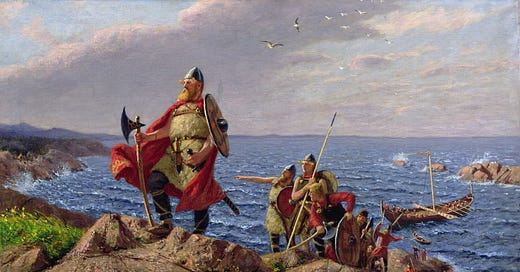



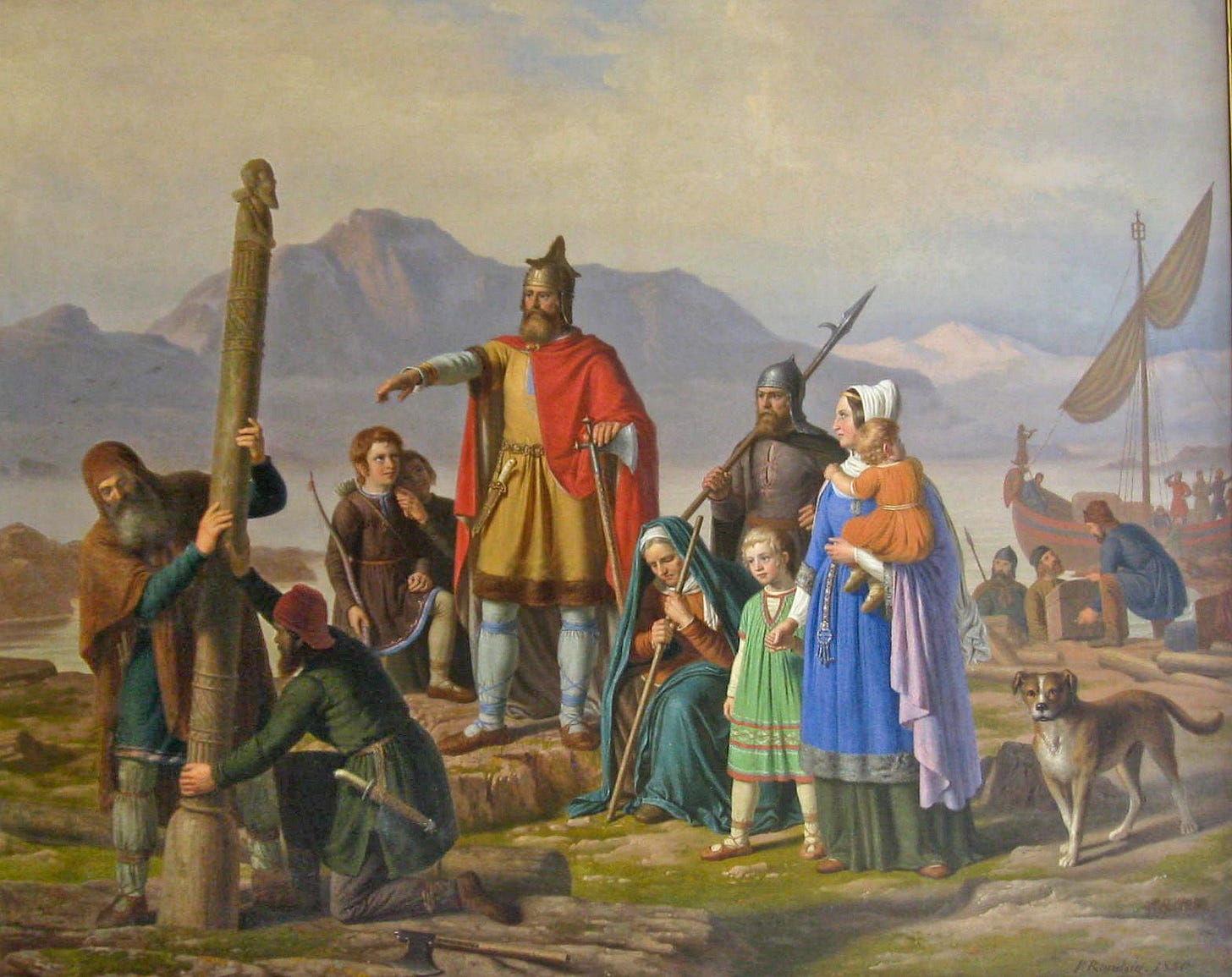
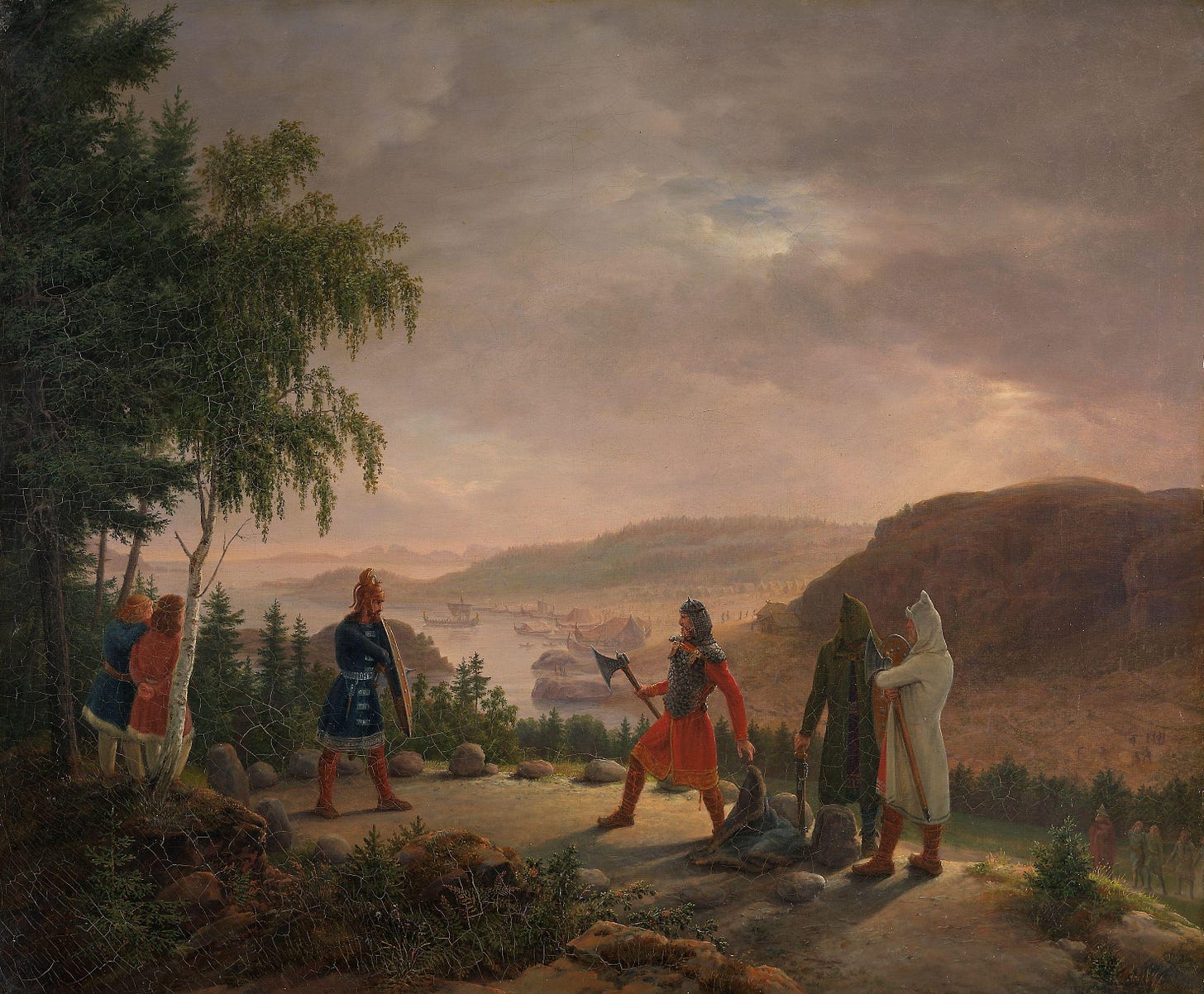
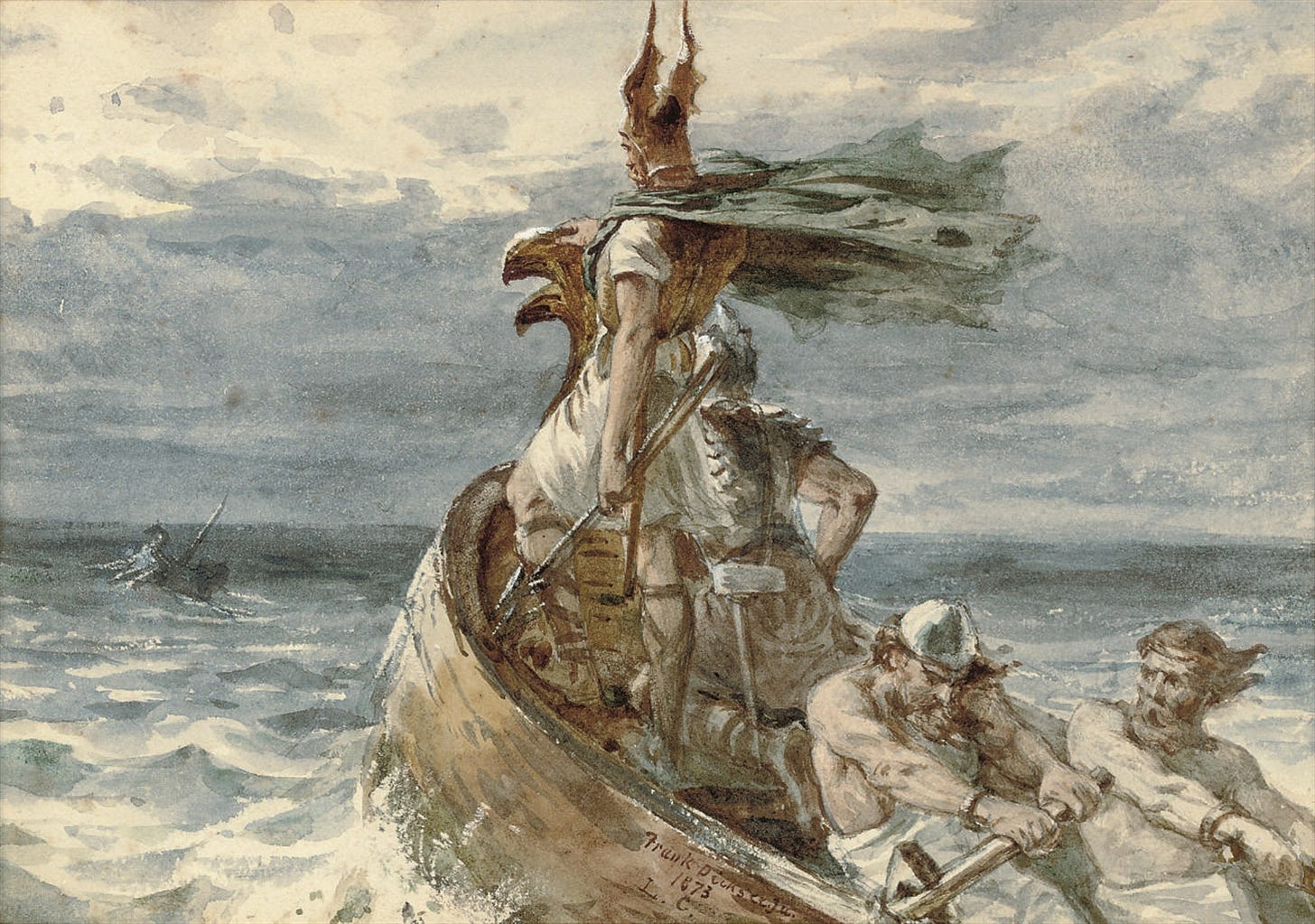
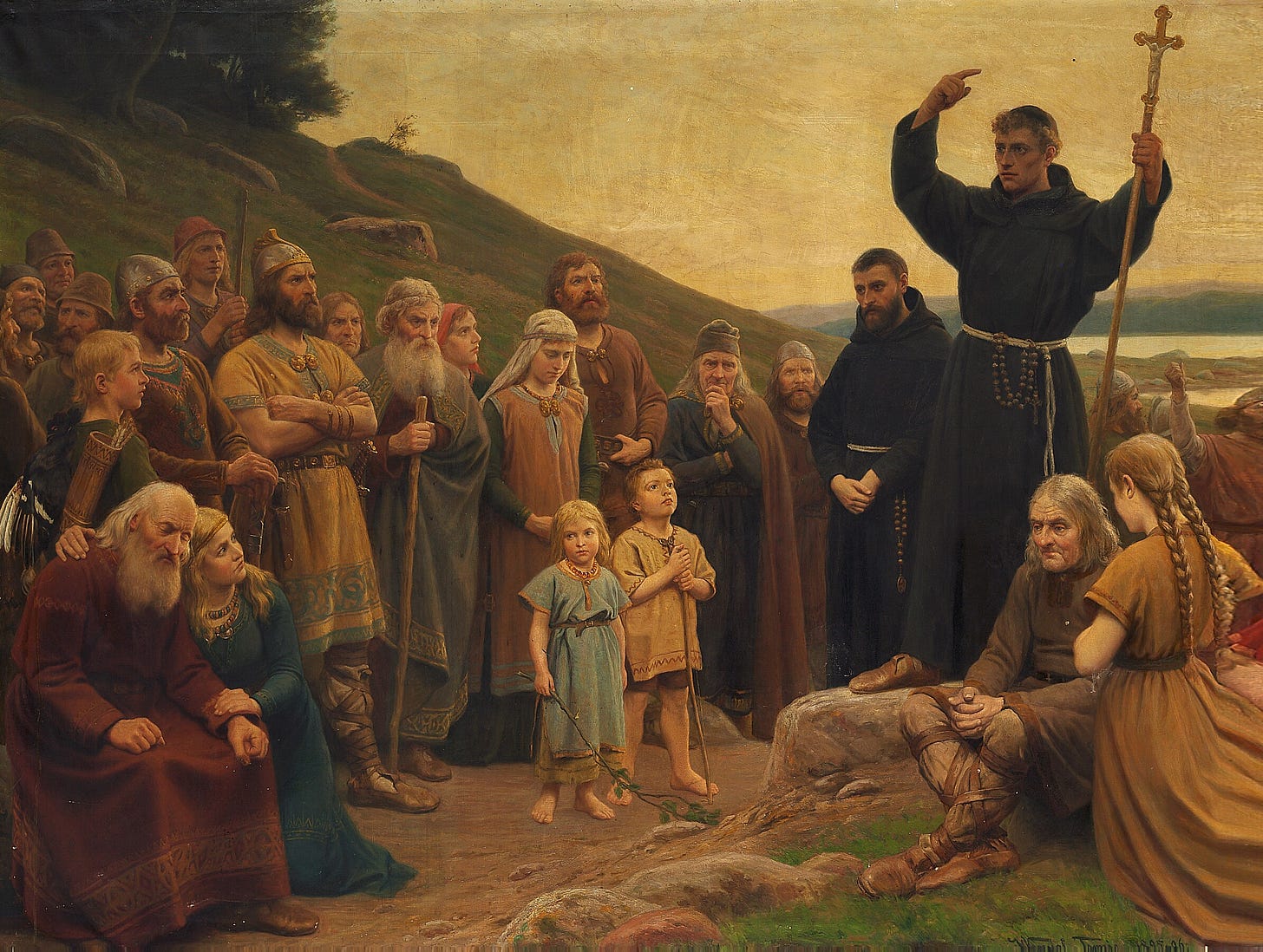
One of the biggest influencen of old Norse on English is the fact we form the pluralen of worden by adding an "s" instead of the Germanic "en" - as hinted at by your eggs/eyren example.
I recently finished reading “The Vikings: A History,” by Robert Ferguson. I never realized how large an impact the Vikings had throughout Europe, Russia, and the Middle East, not just on our language, but also on our system of government.
Interest in Vikings seems to be having a modest bump, which just could be I’m noticing it more. (Insert bad football team joke here.)